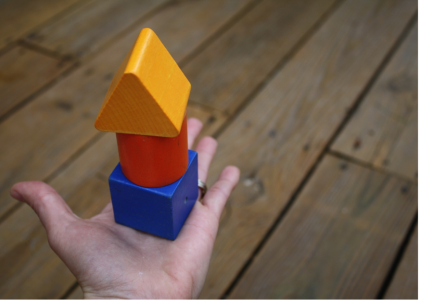Tinkering with the Idea of Bricolage
“Bricolage is a practical process of learning through tinkering with materials. It involves continual transformation, with earlier products or materials that are ready to hand becoming resources for new constructions”. Innovating Pedagogy Report 2014

Bricolage: Taking available pieces and assembling them to make something new.
Bricolage means to engage in a dialogue with a heterogeneous collection of materials and tools, in which items are repurposed and rearranged to solve a problem. Bricolage does not necessitate having a clear end in sight. On the contrary, it requires the stakeholders to be open and start with a vaguely defined idea. The project and its components take shape over time.
Bricolage comprises tools and artifacts that were accumulated over time. This may include material that was collected without any specific purpose, and picked up simply because it might be useful someday; as well as outcomes, products or ‘leftovers’ from other projects. The typical bricolage setting is one of constant remix: Its tools and artifacts are not limited to only use nor does one need specialized expertise to adapt and use them.
Instructional Design Implications
- Learning Process: Engaging in bricolage means learning through creative improvisation, just as a toddler may turn a leaf pile and sticks into an airplane. ‘Rather than replacing forms of informal, self-organized pretend play by school education, bricolage can contribute to creative practices in adult education such as experiental learning activities.
- Transfer Learning / Personal Learning Environments: When looking at learning over time, bricolage is a collage fabricated when students combine little bits and pieces from different domains and learning experiences. As such ‘bricolage’ is a helpful concept to illuminate the process of transfer learning. Allowing room for ‘bricolage’ that can furnish a students’ personal learning environment ties together the often fragmented experience that may potentially derail students’ learning trajectories.
- Educational Technology Systems: In contrast to the traditional engineering approach in which the end product determines the means and methods, bricolage offers opportunities for stakeholder involvement through open, participatory design processes. It allows for unforeseen and chaotic developments as the end product is not clearly known at the outset. It focuses on building, refining and testing (and potentially discarding) rather than defining, planning and implementing.
- Organizational Innovation: Bricolage offers a basis for creative innovation through combining and adapting tools and theories to generate new insights. It fosters collaboration and exchange across disciplinary, divisional or cultural divides. The reasoning process does not use deduction, but is a creative design process.
Recommended in EdITLIb

Jon Dron, Researcher at TERKI (Athabasca University)
Dron, J. (2014). Ten Principles for Effective Tinkering. In Proceedings of World Conference on E-Learning in Corporate, Government, Healthcare, and Higher Education 2014 (pp. 505-513). Chesapeake, VA: Association for the Advancement of Computing in Education (AACE).
Jon Dron argues that ‘bricolage’ is better suited to networked, social, open-ended learning than traditional learning design approaches. He offers ten principles and patterns for effective bricolage:
- Do not design – just build
- Start with pieces that are fully formed and useful
- Surround yourself with both quantity and diversity in tools, materials, methods, and perspectives
- Dabble hard – gain skills, but be suspicious of expertise
- Look for exaptations and surf the adjacent possible
- Avoid schedules and goals, but make time and space for tinkering, and include time for daydreaming
- Do not fear dismantling and starting afresh
- Beware of teams, but cultivate networks: seek people, not processes
- Talk with your creations and listen to what they have to say
- Reflect, and tell stories about your reflections, especially to others
